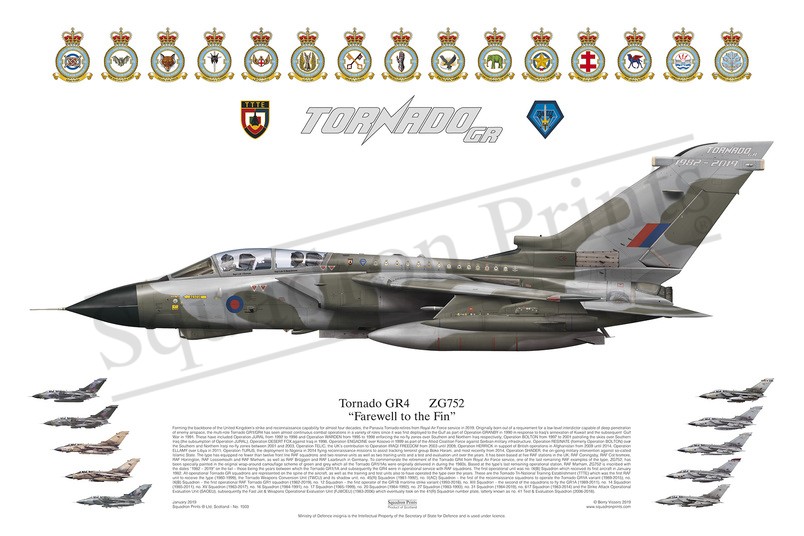#1503 Tornado GR4

Purchased products will not feature the Squadron Prints watermark
Description
Squadron Prints Lithograph No. 1503 - ZG752, Tornado GR4, "Farewell to the Fin".
Forming the backbone of the United Kingdom’s strike and reconnaissance capability for almost four decades, the Panavia Tornado retires from Royal Air Force service in 2019. Originally born out of a requirement for a low-level interdictor capable of deep penetration of enemy airspace, the multi-role Tornado GR1/GR4 has seen almost continuous combat operations in a variety of roles since it was first deployed to the Gulf as part of Operation GRANBY in 1990 in response to Iraq’s annexation of Kuwait and the subsequent Gulf War in 1991. These have included Operation JURAL from 1992 to 1998 and Operation WARDEN from 1995 to 1998 enforcing the no-fly zones over Southern and Northern Iraq respectively, Operation BOLTON from 1997 to 2001 patrolling the skies over Southern Iraq (the subsumption of Operation JURAL), Operation DESERT FOX against Iraq in 1998, Operation ENGADINE over Kosovo in 1999 as part of the Allied Coalition Force against Serbian military infrastructure, Operation RESINATE (formerly Operation BOLTON) over the Southern and Northern Iraqi no-fly zones between 2001 and 2003, Operation TELIC, the UK’s contribution to Operation IRAQI FREEDOM from 2003 until 2009, Operation HERRICK in support of British operations in Afghanistan from 2009 until 2014, Operation ELLAMY over Libya in 2011, Operation TURUS, the deployment to Nigeria in 2014 flying reconnaissance missions to assist tracking terrorist group Boko Haram, and most recently from 2014, Operation SHADER, the on-going military intervention against so-called Islamic State. The type has equipped no fewer than twelve front line RAF squadrons and two reserve units as well as two training units and a test and evaluation unit over the years. It has been based at five RAF stations in the UK; RAF Coningsby, RAF Cottesmore, RAF Honington, RAF Lossiemouth and RAF Marham, as well as RAF Brüggen and RAF Laarbruch in Germany. To commemorate the retirement of the Tornado GR4 from Royal Air Force service, one of the last remaining RAF examples of the type, ZG752, has been specially painted in the original wrap-around camouflage scheme of green and grey which all the Tornado GR1/1As were originally delivered in during the 1980s. Based at the type’s last remaining operational station, RAF Marham, ZG752 is inscribed with the dates “1982 – 2019†on the tail – those being the years between which the Tornado GR1/1A and subsequently the GR4 were in operational service with RAF squadrons. The first operational unit was no. IX(B) Squadron which received its first aircraft in January 1982. All operational Tornado GR squadrons are represented on the spine of the aircraft, as well as the training and test units also to have operated the type over the years. These are the Tornado Tri-National Training Establishment (TTTE) which was the first RAF unit to receive the type (1980-1999), the Tornado Weapons Conversion Unit (TWCU) and its shadow unit, no. 45(R) Squadron (1981-1992), no. II(AC) Squadron – the first of the reconnaissance squadrons to operate the Tornado GR1A variant (1989-2015), no. IX(B) Squadron – the first operational RAF Tornado GR1 squadron (1982-2019), no. 12 Squadron – the first operator of the GR1B maritime strike variant (1993-2018), no. XIII Squadron – the second of the squadrons to fly the GR1A (1989-2011), no. 14 Squadron (1985-2011), no. XV Squadron (1983-2017), no. 16 Squadron (1984-1991), no. 17 Squadron (1985-1999), no. 20 Squadron (1984-1992), no. 27 Squadron (1983-1993), no. 31 Squadron (1984-2019), no. 617 Squadron (1983-2014) and the Strike Attack Operational Evaluation Unit (SAOEU), subsequently the Fast Jet & Weapons Operational Evaluation Unit (FJWOEU) (1983-2006) which eventually took on the 41(R) Squadron number plate, latterly known as no. 41 Test & Evaluation Squadron (2006-2018).
